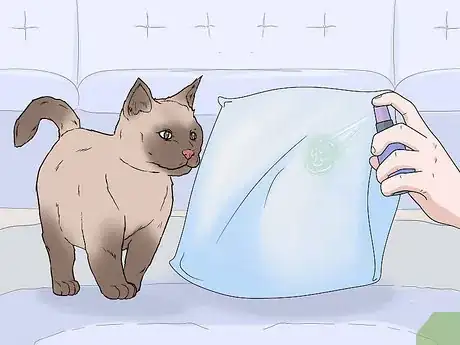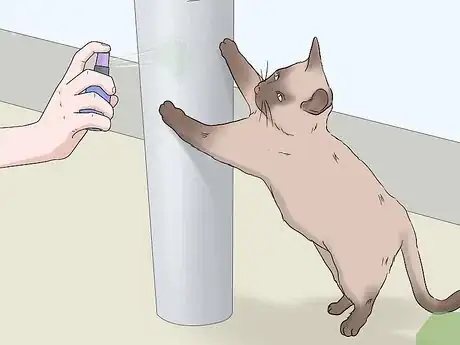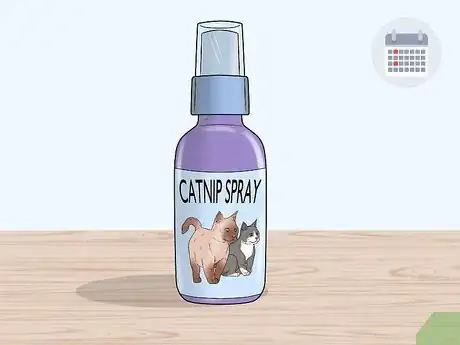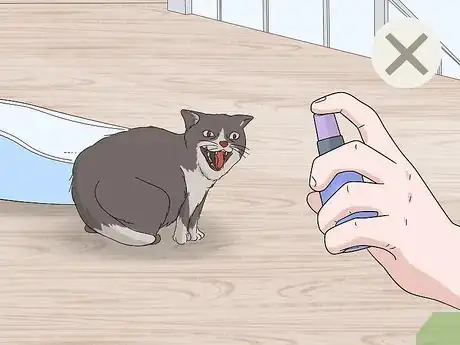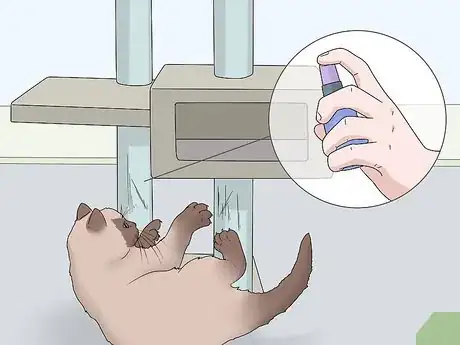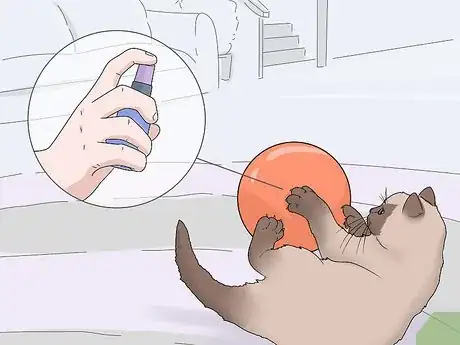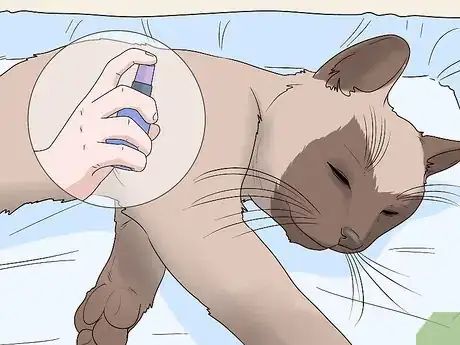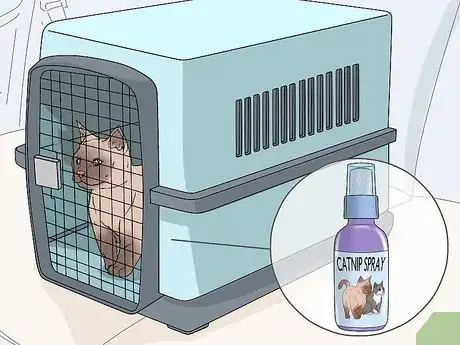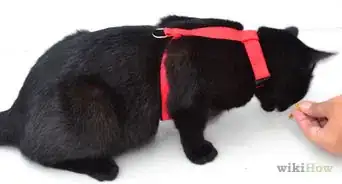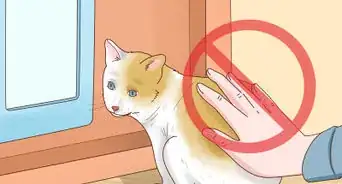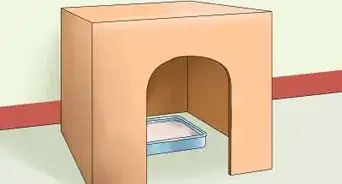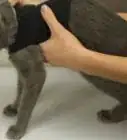This article was co-authored by wikiHow Staff. Our trained team of editors and researchers validate articles for accuracy and comprehensiveness. wikiHow's Content Management Team carefully monitors the work from our editorial staff to ensure that each article is backed by trusted research and meets our high quality standards.
This article has been viewed 36,255 times.
Learn more...
Ah, catnip—the famous plant that cats just can’t seem to get enough of! Catnip works for about 70 to 90 percent of cats and is a convenient alternative to making a mess with catnip leaves.[1] In this article, we’ll show you all the best uses for catnip spray and where to apply it to make your furry friend feel comfy and playful. Let’s get started!
Things You Should Know
- Spray catnip on scratching posts and toys. This encourages your kitty to get some play and exercise (and keep those claws away from your furniture).
- Spray new cat beds, carriers, or crates with catnip to make your cat feel more at ease.
- Use catnip spray about once every 2 weeks so your cat doesn’t become too accustomed to it. Stop giving it to them if it makes them cranky or aggressive.
Steps
Using Catnip Effectively
-
1Test if your cat is affected by catnip or not. Between 10 and 30 percent of cats are not responsive to catnip. Spray an item with catnip spray and let your cat sniff it. If your cat doesn't react or do anything unusual, it may not be affected by catnip. If that's the case, catnip spray may not be right for your cat.[2]
- When cats smell the oils from a catnip plant, they'll often roll around and rub against whatever surface has the catnip on it. The effects usually last for around 15 minutes. Afterward, they may feel more mellow and content. Keep in mind that every cat is different!
- Kittens may not respond to catnip, but that could change as they get older.
- Senior cats also tend to be less responsive to catnip.
- Always purchase catnip spray from a trusted online source or brick-and-mortar pet store.
-
2Use catnip spray for training and fun. Catnip spray can be a helpful tool for teaching your cat to use things like scratching posts, beds, carriers, and toys. Spraying something you want your cat to start using will get it interested in the item.[3]
- For example, if you want to play with your cat with a new toy but they don’t seem interested in it, you can spray it with catnip to get your cats attention. They will associate the item with fun and good feelings after that, so they’ll know it’s playtime when they see the toy!
Advertisement -
3Give your cat catnip once every 2 weeks or so. Catnip will produce the best results if you don’t give it to your cat too often. Use catnip spray every 2 weeks so your cat doesn’t become too accustomed to it. However, all cats are different, so find the frequency that works best for you and your cat.[4]
- The more cats are exposed to catnip, the less interested they tend to be. Limiting their exposure to once every 2 weeks will ensure they are responsive when you want to use the catnip spray again.
Tip: Catnip is completely safe and non-toxic and there is no risk of cats overdosing on catnip if you give them too much or give it to them too often. It just won’t have the same effects if you overdo it.
-
4Stop using catnip spray if your cat becomes cranky or aggressive. Catnip affects all cats differently, and some cats display heightened aggressive behavior. If your cat becomes aggressive, take away any objects you sprayed and try again at another time. If your cat always responds negatively to catnip, you may want to stop using it altogether.[5]
- It’s also best to avoid giving catnip spray to cats that already tend to be aggressive.
-
5Remove an item you sprayed with catnip after 15 minutes. Take away an item covered in catnip if your cat shows no signs of losing interest on their own after about 15 minutes because prolonged exposure can cause nausea in some cats.[6]
- Most cats lose interest in catnip after the initial effects wear off, within around 10-15 minutes.
Spraying Different Surfaces
-
1Spray catnip on a scratching post to encourage your cat to use it. Spritz each side of the scratching post with 1-2 sprays of catnip from the spray bottle. This will help your cat associate the post with something positive and start to use it instead of scratching your couch or other furniture.[7]
- If your cat already has a favorite scratching surface, such as a sofa or bed, it can help to place the scratching post near the favorite surface so your cat is more likely to use the post as an alternative.
Tip: A little catnip goes a long way, so you never need to try and completely saturate a surface to get your cat interested. A single spray on each side of an object is usually plenty!
-
2Apply catnip spray to toys to get your cat to play and exercise. Spray each side of a toy once with catnip spray so your cat will be interested in the object and play with it. It will enjoy rolling around with and batting the toy with its paws to get some exercise.[8]
- Ideas of highly interactive toys you can spray with catnip are bouncy balls or balls hanging from strings.
-
3Spray catnip in new environments to make your cat feel more comfortable. Use catnip spray to make your cat feel welcome when you first bring it home or when you move to a new place. Spritz catnip around a specific room that you want your cat to feel comfortable in, or throughout the entire home, so it will start to feel relaxed and less scared.[9]
- When you first bring a new cat home or move to a new place with your cat, it will likely choose a hiding spot to stay in for the first day or first few days. You can spray catnip just outside of this hiding spot to make your cat feel comfortable and start exploring.
-
4Put catnip spray on a new bed to encourage your cat to sleep in it. Spray 2-3 sprays of catnip onto the new bed and show it to your cat. This will encourage your cat to climb into the bed and feel happy and relaxed there.[10]
- Catnip makes many cats feel mellow and calm after the first 15 minutes or so of excitement, so your cat might just plop right down in the bed and take a peaceful, cozy nap after the initial effects wear off.
-
5Use catnip spray in crates or carriers to reduce your cat’s anxiety during trips. Spritz the inside of your cat’s crate or carrier 2-3 times with catnip spray just before you need to take your cat on a trip to the vet or elsewhere. Your cat will feel more relaxed during the journey and might even enter a sedated state.[11]
- This will also help your cat associate trips outside of your home with a positive feeling, which might make it easier to get your cat into its crate or carrier the next time you need to.
Warnings
- Take away an item you sprayed with catnip after 15 minutes if your cat doesn’t lose interest on its own. Prolonged exposure can cause nausea in some cats.[14]⧼thumbs_response⧽
- Don’t give aggressive cats catnip spray and remove catnip from near your cat if it starts acting grumpy or aggressive.[15]⧼thumbs_response⧽
References
- ↑ https://www.vetwest.com.au/pet-library/catnip
- ↑ https://www.vetwest.com.au/pet-library/catnip
- ↑ https://www.vetwest.com.au/pet-library/catnip
- ↑ https://www.petful.com/pet-health/can-cats-overdose-on-catnip/
- ↑ https://www.petful.com/pet-health/can-cats-overdose-on-catnip/
- ↑ https://www.petful.com/pet-health/can-cats-overdose-on-catnip/
- ↑ http://agris.fao.org/agris-search/search.do?recordID=AU9401757
- ↑ https://www.humanesociety.org/resources/crazy-catnip
- ↑ https://www.vetwest.com.au/pet-library/catnip
- ↑ https://www.aspca.org/pet-care/animal-poison-control/toxic-and-non-toxic-plants/catnip
- ↑ https://www.vetwest.com.au/pet-library/catnip
- ↑ https://www.petful.com/pet-health/can-cats-overdose-on-catnip/
- ↑ https://www.vetwest.com.au/pet-library/catnip
- ↑ https://www.petful.com/pet-health/can-cats-overdose-on-catnip/
- ↑ https://www.petful.com/pet-health/can-cats-overdose-on-catnip/
